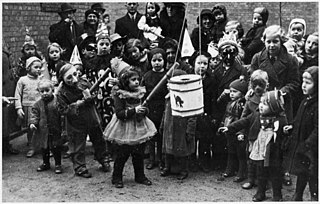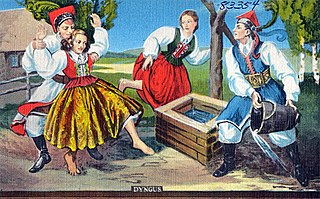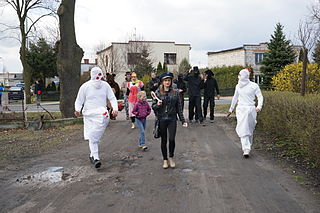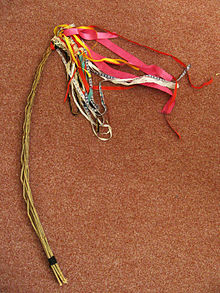
Easter eggs, also called Paschal eggs, are eggs that are decorated for the Christian holiday of Easter, which celebrates the resurrection of Jesus. As such, Easter eggs are commonly used during the season of Eastertide. The oldest tradition, which continues to be used in Central and Eastern Europe, is to dye and paint chicken eggs.

May Day is a European festival of ancient origins marking the beginning of summer, usually celebrated on 1 May, around halfway between the spring equinox and summer solstice. Festivities may also be held the night before, known as May Eve. Traditions often include gathering wildflowers and green branches, weaving floral garlands, crowning a May Queen, and setting up a Maypole, May Tree or May Bush, around which people dance. Bonfires are also part of the festival in some regions. Regional varieties and related traditions include Walpurgis Night in central and northern Europe, the Gaelic festival Beltane, the Welsh festival Calan Mai, and May devotions to the Blessed Virgin Mary. It has also been associated with the ancient Roman festival Floralia.

Spanking is a form of corporal punishment involving the act of striking, with either the palm of the hand or an implement, the buttocks of a person to cause physical pain. The term spanking broadly encompasses the use of either the hand or implement, the use of implements can also refer to the administration of more specific types of corporal punishment such as caning, paddling and slippering.

A corporal punishment or a physical punishment is a punishment which is intended to cause physical pain to a person. When it is inflicted on minors, especially in home and school settings, its methods may include spanking or paddling. When it is inflicted on adults, it may be inflicted on prisoners and slaves.

Egg decorating is the art or craft of decorating eggs. It has been a popular art form throughout history because of the attractive, smooth, oval shape of the egg, and the ancient associations with eggs as a religious and cultural symbol. Egg decorating has been associated with Easter in recent times, but was practiced independently by many ancient cultures.

Marzanna, Morė, Marena, Mara, Morana, Morena or Mora is a pagan Slavic goddess associated with seasonal rites based on the idea of death and rebirth of nature. She is an ancient goddess associated with winter's death, rebirth and dreams. In ancient Slavic rites, the death of the Goddess Marzanna at the end of winter becomes the rebirth of Spring of the Goddess Kostroma (Russian), Lada or Vesna representing the coming of Spring.

Easter Monday is the second day of Eastertide and a public holiday in some countries. In Western Christianity it marks the second day of the Octave of Easter; in Eastern Christianity it marks the second day of Bright Week.

Paska is a Ukrainian Easter bread. It is particularly spread in Central and Eastern Europe, and countries with cultural connections to the ancient Byzantine Empire, Eastern Orthodoxy or Eastern Catholicism. Easter breads are a traditional element in the Easter holidays of Armenia, Belarus, Bulgaria, Croatia, Georgia, Moldova, Romania, Russia, Poland, Slovakia and Ukraine. It is also a common tradition amongst the Assyrian-Chaldean-Syriac diaspora. It is also eaten in countries with large immigrant populations from Central and Eastern Europe such as the United States, Canada and the United Kingdom.

Czech culture has been shaped by the nation's geographical position in the middle of Europe, the Slavic ethnicity of Czechs, influences from its neighbors, political and social changes, wars and times of peace.

Fastelavn is a Carnival tradition in the Northern European, and historically Lutheran, nations of Denmark, Norway, Sweden, Latvia, Estonia, Iceland, Faroe Islands, as well as Greenland.

The tradition of egg decoration in Slavic cultures originated in pagan times, and was transformed by the process of religious syncretism into the Christian Easter egg. Over time, many new techniques were added. Some versions of these decorated eggs have retained their pagan symbolism, while others have added Christian symbols and motifs.

Saint Nicholas is a legendary figure in European folklore based on the Greek early Christian bishop Nicholas of Myra, patron saint of children.

The poppy seed roll is a pastry consisting of a roll of sweet yeast bread with a dense, rich, bittersweet filling of poppy seed. An alternative filling is a paste of minced walnuts, or minced chestnuts.

Easter traditions are customs and practices that are followed in various cultures and communities around the world to celebrate Easter, which is the central feast in Christianity, commemorating the resurrection of Jesus. The Easter season is seen as a time of celebration and feasting, in contrast to the antecedent season of Lent, which is a time of penitence and fasting.

Czech folklore is the folk tradition which has developed among the Czech people over a number of centuries. Czech folklore was influenced by a mix of Christian and pagan customs. Nowadays it is preserved and kept alive by various folklore ensembles uniting members of all ages, from children to seniors, showing their talent during competitions, folklore festivals or other performances.

Śmigus-dyngus or lany poniedziałek is a celebration held on Easter Monday across Central Europe, and in small parts of Eastern and Southern Europe. The tradition is widely associated with Poland in English-speaking countries and is observed by Polish diaspora communities, particularly among Polish Americans who call it Dyngus Day. The tradition is also deeply rooted in Hungary.

The holiday of Easter is associated with various Easter customs and foodways. Preparing, coloring, and decorating Easter eggs is one such popular tradition. Lamb is eaten in many countries, mirroring the Jewish Passover meal.

Śmiergust is a long-standing folk custom popular in some parts of Poland, particularly in and around the town of Wilamowice. During śmiergust young men are dousing young unmarried women with water. The celebrations take place on the Market Square of Wilamowice on Wet Monday, and in or near the women's homes on Easter Sunday. Śmiergust participants are groups of dressed-up men, wearing special patchwork costumes.

Siwki or Siwek is a regional tradition rooted in Polish folklore, in which a procession of dressed up individuals stops passers-by and performs tricks on them. The event usually takes place on Easter Sunday or Easter Monday.

Slavic carnivals are known under different names in various Slavic countries: Bulgarian: Сирни заговезни, Прошка, Поклади, romanized: Sirni zagovezni, Proshka, Pokladi; Macedonian: Прочка, romanized: Pročka; Russian: Масленица, Мясопуст, romanized: Maslenitsa, Myasopust; Polish: Ostatki, Mięsopust, Zapusty; Czech: Masopust, Šibřinky, Ostatky; Slovak: Fašiangy; Slovene: Mesopȗst, Pust, Pustni teden, Fašnk; Serbian: Покладе, Проћка / Poklade, Proćka; Croatian: Pust, Poklade, Mesopust, Fašnik. They are traditional Slavic festivals related to the period of carnival.



















